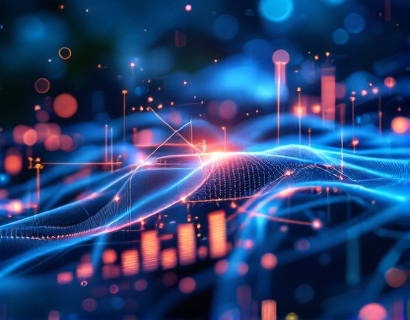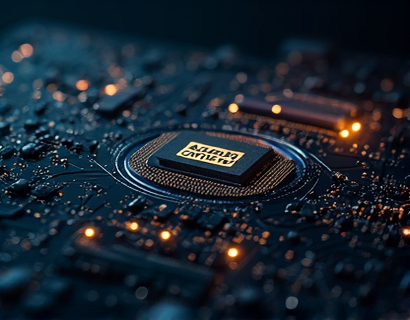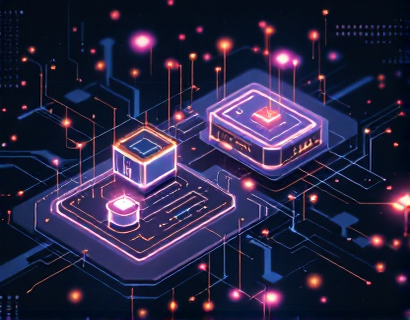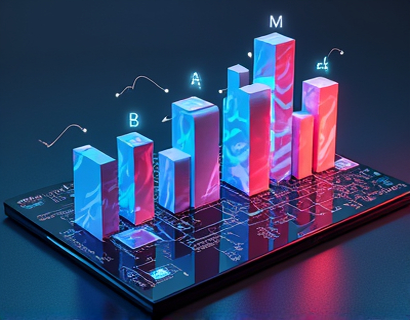Efficient Oracle Management and Blockchain Service Access: Revolutionizing Decentralized Applications with Advanced Software Solutions
In the rapidly evolving landscape of blockchain technology, the role of oracles and service access has become increasingly critical for the development and operation of decentralized applications (dApps). Oracles serve as the bridge between the blockchain and the external world, providing real-time data and enabling smart contracts to interact with off-chain information. However, managing these oracles efficiently and ensuring seamless integration with blockchain services remains a challenge for developers and businesses. This article delves into advanced software solutions that address these challenges, focusing on optimizing data integration and enhancing smart contract capabilities to revolutionize the way dApps operate.
Understanding the Importance of Oracle Management
Oracles play a pivotal role in the functionality of smart contracts by supplying them with necessary data from external sources. This data can range from simple values like time stamps and sensor readings to complex financial and market data. The reliability and security of this data are paramount, as any inaccuracies or delays can lead to significant issues within the dApp. Traditional oracle solutions often suffer from centralized bottlenecks, single points of failure, and high latency, which can compromise the integrity and performance of decentralized applications.
Efficient oracle management is essential to mitigate these risks. It involves selecting the right oracles, managing their data feeds, ensuring data integrity, and handling potential failures. Advanced software solutions are designed to automate and streamline these processes, providing developers with tools to build robust and scalable oracle networks. These solutions not only enhance the reliability of data but also reduce the operational overhead, allowing developers to focus on core application development.
Key Features of Advanced Oracle Management Software
Advanced oracle management software offers a suite of features that address the core challenges faced by developers. These include:
- Oracle Selection and Management: The ability to dynamically select and manage multiple oracles ensures that data is sourced from the most reliable and up-to-date providers. This feature helps in reducing the risk of data manipulation and enhances the overall trustworthiness of the data fed into smart contracts.
- Data Validation and Filtering: Advanced algorithms and machine learning techniques are employed to validate and filter incoming data. This ensures that only accurate and relevant data is used by smart contracts, minimizing the risk of errors and inconsistencies.
- Real-Time Data Integration: Real-time data integration is crucial for applications that require up-to-the-minute information. Advanced software solutions provide low-latency data feeds, enabling dApps to respond promptly to external changes.
- Security Measures: Security is a top priority in oracle management. These solutions implement robust encryption, authentication, and authorization mechanisms to protect data integrity and prevent unauthorized access.
- Scalability and Flexibility: As dApps grow, the oracle management system must scale accordingly. Advanced solutions are designed to handle increasing data volumes and support a growing number of oracles without compromising performance.
Enhancing Blockchain Service Access
Beyond oracle management, accessing blockchain services efficiently is another critical aspect of building robust dApps. This involves integrating various blockchain-based services such as decentralized exchanges, payment systems, and identity verification platforms. Advanced software solutions facilitate this integration by providing APIs and SDKs that simplify the development process.
One of the key benefits of these solutions is the ability to abstract complex blockchain interactions, allowing developers to focus on building user-friendly interfaces and core functionalities. This abstraction layer handles tasks such as transaction signing, gas optimization, and error handling, reducing the development time and minimizing the risk of bugs.
Decentralized Exchanges Integration
Decentralized exchanges (DEXs) are a prime example of blockchain services that require efficient management and integration. Advanced software solutions offer DEX APIs that enable seamless trading experiences within dApps. These APIs support a wide range of functionalities, including order management, liquidity provision, and real-time market data access. By leveraging these APIs, developers can create sophisticated trading platforms that offer the same benefits as centralized exchanges but with the added advantages of decentralization and transparency.
Payment Systems and Microtransactions
Blockchain-based payment systems are revolutionizing the way transactions are handled, especially for microtransactions. Advanced software solutions provide payment APIs that support multiple cryptocurrencies and tokens, enabling dApps to accept payments seamlessly. These APIs ensure low transaction fees, high throughput, and fast confirmation times, making them ideal for applications that require frequent and small transactions, such as gaming and content monetization.
Identity Verification and Access Control
Identity verification and access control are critical components of secure dApps. Advanced solutions offer identity management services that integrate with blockchain-based identity protocols. These services provide secure and privacy-preserving ways to verify user identities and manage access permissions. By leveraging these services, developers can build dApps that comply with regulatory requirements while maintaining user privacy and security.
Optimizing Smart Contract Performance
Smart contracts are the backbone of decentralized applications, executing predefined logic based on external data provided by oracles. However, the performance and efficiency of smart contracts can significantly impact the overall user experience of a dApp. Advanced software solutions offer tools and best practices to optimize smart contract performance.
One key aspect is gas optimization, which involves minimizing the computational resources required to execute smart contract functions. This can be achieved through techniques such as reducing the number of state changes, using efficient data structures, and leveraging batch operations. Advanced tools analyze smart contract code and provide recommendations to improve gas efficiency, ensuring that dApps operate cost-effectively on blockchain networks.
Another important feature is testing and deployment tools. These tools allow developers to simulate smart contract behavior in a test environment, identifying and fixing issues before deployment. Continuous integration and deployment (CI/CD) pipelines integrated with these tools streamline the development process, enabling rapid iteration and deployment of updated smart contracts.
Case Studies and Real-World Applications
To illustrate the impact of advanced oracle management and blockchain service access solutions, consider a few real-world applications:
- Decentralized Finance (DeFi) Platforms: DeFi platforms leverage oracles to access real-time market data, enabling features like automated trading and lending. Advanced oracle management ensures that these platforms operate smoothly, providing accurate and timely data to execute trades and manage assets.
- Supply Chain Management: Blockchain-based supply chain solutions use oracles to track and verify the movement of goods. Advanced software solutions provide real-time data feeds that enhance transparency and traceability, helping businesses ensure compliance and improve efficiency.
- Digital Identity Verification: Identity verification dApps use blockchain oracles to access external identity providers, ensuring secure and compliant user authentication. Advanced integration tools simplify the implementation of these systems, making them accessible to a wide range of applications.
Future Trends and Innovations
The landscape of oracle management and blockchain service access is continually evolving, driven by technological advancements and increasing adoption. Some of the key trends and innovations to watch include:
- Interoperability Solutions: As blockchain ecosystems become more diverse, the need for interoperability solutions that allow seamless data exchange between different blockchains grows. Advanced software solutions are developing protocols and middleware to facilitate cross-chain oracle services.
- AI and Machine Learning Integration: The integration of AI and machine learning with oracle management can enhance data validation and prediction capabilities. These technologies can predict data anomalies and optimize data sourcing strategies, further improving the reliability of smart contracts.
- Zero-Knowledge Proofs: Zero-knowledge proofs (ZKPs) offer a way to verify data without revealing the actual data. Advanced oracle solutions are exploring the use of ZKPs to enhance privacy and security, allowing smart contracts to trust external data without compromising confidentiality.
These innovations promise to make oracle management and blockchain service access even more efficient and secure, opening up new possibilities for decentralized applications.
Conclusion
Efficient oracle management and seamless blockchain service access are fundamental to the success of decentralized applications. Advanced software solutions provide the tools and infrastructure needed to overcome the challenges associated with oracles and blockchain integration. By optimizing data integration and enhancing smart contract capabilities, these solutions empower developers and businesses to build robust, scalable, and secure dApps. As the blockchain ecosystem continues to grow, the importance of these solutions will only increase, driving further innovation and adoption.










































